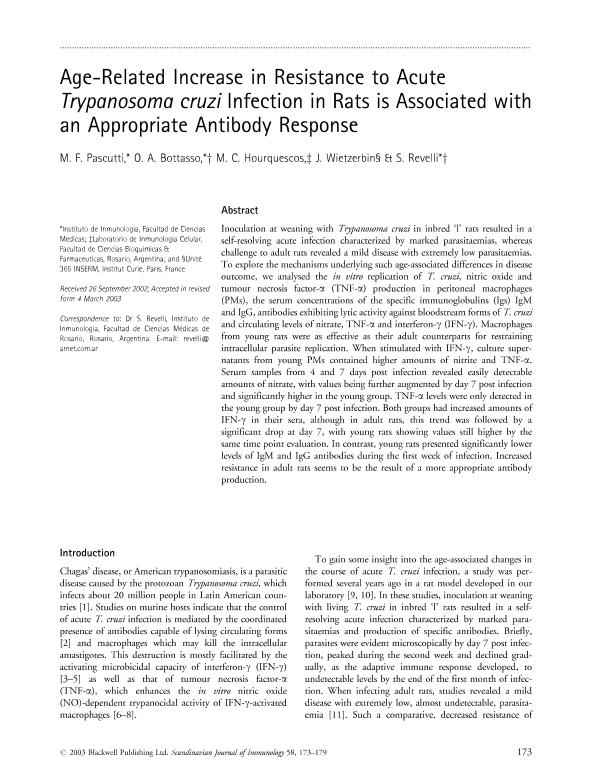Artículo
Age-related increase in resistance to acute Trypanosoma cruzi infection in rats is associated with an appropriate antibody response
Pascutti, María Fernanda ; Bottasso, Oscar Adelmo
; Bottasso, Oscar Adelmo ; Hourquescos, M. C.; Wietzerbin, Jeanne; Revelli, Silvia Susana
; Hourquescos, M. C.; Wietzerbin, Jeanne; Revelli, Silvia Susana
 ; Bottasso, Oscar Adelmo
; Bottasso, Oscar Adelmo ; Hourquescos, M. C.; Wietzerbin, Jeanne; Revelli, Silvia Susana
; Hourquescos, M. C.; Wietzerbin, Jeanne; Revelli, Silvia Susana
Fecha de publicación:
07/2003
Editorial:
Wiley Blackwell Publishing, Inc
Revista:
Scandinavian Journal Of Immunology
ISSN:
0300-9475
Idioma:
Inglés
Tipo de recurso:
Artículo publicado
Clasificación temática:
Resumen
Inoculation at weaning with Trypanosoma cruzi in inbred 'l' rats resulted in a self-resolving acute infection characterized by marked parasitaemias, whereas challenge to adult rats revealed a mild disease with extremely low parasitaemias. To explore the mechanisms underlying such age-associated differences in disease outcome, we analysed the in vitro replication of T. cruzi, nitric oxide and tumour necrosis factor-α (TNF-α) production in peritoneal macrophages (PMs), the serum concentrations of the specific immunoglobulins (Igs) IgM and IgG, antibodies exhibiting lytic activity against bloodstream forms of T. cruzi and circulating levels of nitrate, TNF-α and interferon-γ (IFN-γ). Macrophages from young rats were as effective as their adult counterparts for restraining intracellular parasite replication. When stimulated with IFN-γ, culture supernatants from young PMs contained higher amounts of nitrite and TNF-α. Serum samples from 4 and 7 days post infection revealed easily detectable amounts of nitrate, with values being further augmented by day 7 post infection and significantly higher in the young group. TNF-α levels were only detected in the young group by day 7 post infection. Both groups had increased amounts of IFN-γ in their sera, although in adult rats, this trend was followed by a significant drop at day 7, with young rats showing values still higher by the same time point evaluation. In contrast, young rats presented significantly lower levels of IgM and IgG antibodies during the first week of infection. Increased resistance in adult rats seems to be the result of a more appropriate antibody production.
Palabras clave:
T. cruzi
,
rats
,
age-related protection
Archivos asociados
Licencia
Identificadores
Colecciones
Articulos(IDICER)
Articulos de INSTITUTO DE INMUNOLOGIA CLINICA Y EXPERIMENTAL DE ROSARIO
Articulos de INSTITUTO DE INMUNOLOGIA CLINICA Y EXPERIMENTAL DE ROSARIO
Articulos(OCA HOUSSAY)
Articulos de OFICINA DE COORDINACION ADMINISTRATIVA HOUSSAY
Articulos de OFICINA DE COORDINACION ADMINISTRATIVA HOUSSAY
Citación
Pascutti, María Fernanda; Bottasso, Oscar Adelmo; Hourquescos, M. C.; Wietzerbin, Jeanne; Revelli, Silvia Susana; Age-related increase in resistance to acute Trypanosoma cruzi infection in rats is associated with an appropriate antibody response; Wiley Blackwell Publishing, Inc; Scandinavian Journal Of Immunology; 58; 2; 7-2003; 173-179
Compartir
Altmétricas



